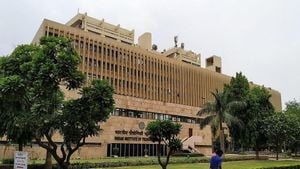Shab-e-Barat, one of the holiest nights for Muslims, is celebrated on the 15th night of Sha'ban, the eighth month of the Islamic lunar calendar. This significant occasion is revered as the 'Night of Forgiveness', where devotees engage deeply with their spirituality, dedicATING the night to prayer and reflection. They seek divine mercy, blessings, and forgiveness from the Almighty, leveraging this night as an opportunity to reconnect with their faith and pursue redemption.
Shab-e-Barat will be observed this year from the evening of Thursday, February 13, to the evening of Friday, February 14, 2025. This date is determined by the sighting of the crescent moon marking the month of Sha'ban. The night is known by various names across the world, including Lailatul Barat in Arabic, and Nisfu Sha'ban or Malam Nisfu Sha’ban in Indonesia and Malaysia. This variety of names reflects the diverse cultures and traditions through which Muslims connect with this sacred observance.
The historical significance of Shab-e-Barat is captured through various Islamic narratives. Sunni traditions often relate the night to the Prophet Muhammad's entry to Makkah, as well as his prayers for the souls at Medina's cemetery. Shia Muslims mark this occasion as the birth date of Muhammad al-Mahdi, the twelfth Imam. These various beliefs underline the rich history and importance of the night, fostering deep reverence among believers. According to one belief, it is on this night when Allah determines the destinies of individuals for the upcoming year based on their past actions.
On Shab-e-Barat, it is not just the personal connection with faith that's emphasized, but also the communal aspect of worship. The night is utilized for seeking Allah's forgiveness not only for oneself but also for their loved ones and the deceased. Anecdotes reveal how the night serves as a pivotal juncture for Muslims; many spend the hours engaged in voluntary prayers (Nafl Salah), reciting the Quran, and performing special supplications (duas).
Visiting graveyards is another common tradition on this night. Muslims often go to grave sites of relatives and friends to offer prayers, place flowers, and sometimes light candles or incense as part of the remembrance rituals. Many believe this practice extends mercy not only to the souls of the deceased but helps draw the blessings of Allah onto the living as well.
Acts of charity also play a prominent role during Shab-e-Barat. Many choose this night to distribute food and alms to the less fortunate, thereby performing good deeds and fostering community connections. Special sweets are frequently prepared and shared among family and neighbors, reinforcing bonds and spreading joy on this auspicious occasion.
Islamic scholars stress the importance of dedicATING the latter half of the night to worship, offering plenty of time for dhikr (the remembrance of Allah) and contemplation. This period is believed to bring exceptional rewards for those who engage earnestly, emphasizing the intrinsic value of sincerity during the hours spent seeking guidance and forgiveness.
Shab-e-Barat also serves as preparation for the upcoming holy month of Ramadan, offering believers the opportunity to reflect on their actions and resolve to make improvements as they approach the season of fasting. Many see it both as an end and beginning—a time to seek forgiveness for the past and prepare hearts and souls for the challenges and blessings Ramadan brings.
This year, Shab-e-Barat has been recognized at the governmental level as well. The state of West Bengal announced holiday closures for all state-run offices, schools, and institutions on both February 13 and February 14, emphasizing the significance of this observance. Similarly, the Telangana government has declared school holidays for the occasion, ensuring communities can fully partake in their traditions without work or school commitments hindering participation.
For many, Shab-e-Barat encapsulates the essence of faith and community, serving as both 'The Night of Fortune and Forgiveness' and as preparation for the holy month of Ramadan. It is not merely about seeking mercy but also about reinforcing relationships—whether they be with God or within communities. The observance encourages introspection, promotes acts of kindness, and invites Muslims worldwide to unite in devotion, marking this night as one of significance and hope within the Islamic calendar.



